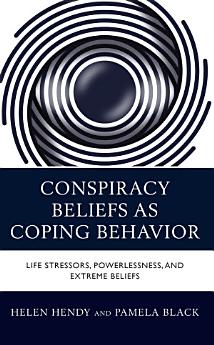Conspiracy Beliefs as Coping Behavior: Life Stressors, Powerlessness, and Extreme Beliefs
Oct 2022 · Bloomsbury Publishing PLC
Ebook
190
Pages
reportRatings and reviews aren’t verified Learn More
About this ebook
This book provides new answers to who and psychologically why individuals sometimes adopt conspiracy beliefs and thoughts of violence. Five conspiracy beliefs are considered: Government Malfeasance, Malevolent World Power, Extra-terrestrial Cover-up, Personal Well-being Threat, and Control of Information. Using a survey of 977 US citizens, the book compares thirteen possible demographic characteristics (who?) to see which ones are most associated with extreme beliefs. The book then evaluates a three-step psychological sequence (why?) in which individuals experiencing intense life stressors (health, money, or loneliness), combined with powerlessness (displayed as PTSD symptoms), have increased risk for extreme beliefs, perhaps because they offer a sense of understanding, strength, and community.
About the author
Helen M. Hendy is professor emeritus of psychology at Penn State Schuylkill.
Pamela Black is professor of criminal justice at Penn State Hazelton and the Discipline Coordinator for Social Sciences and Education in the University College.
Pamela Black is professor of criminal justice at Penn State Hazelton and the Discipline Coordinator for Social Sciences and Education in the University College.
Rate this ebook
Tell us what you think.
Reading information
Smartphones and tablets
Install the Google Play Books app for Android and iPad/iPhone. It syncs automatically with your account and allows you to read online or offline wherever you are.
Laptops and computers
You can listen to audiobooks purchased on Google Play using your computer's web browser.
eReaders and other devices
To read on e-ink devices like Kobo eReaders, you'll need to download a file and transfer it to your device. Follow the detailed Help Center instructions to transfer the files to supported eReaders.





